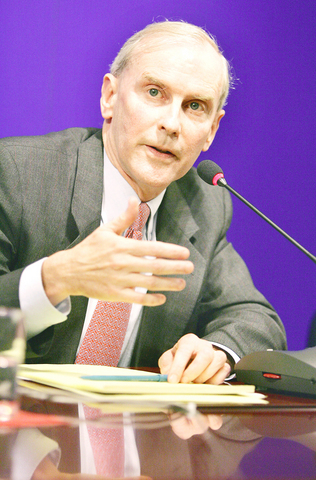Calling himself a "new Taiwanese," American Institute in Taiwan (AIT) Director Stephen Young refused to be labeled green, blue or red during the recent political brouhaha, saying that his true colors were red, white and blue -- the colors of the US flag.
"I am none of those colors [green, blue or red]. You all [people of Taiwan] don't make that easy but that's what I try and do every day," Young said last Thursday at a press conference in Taipei.
During the press conference, which Young held to convey the US government's perspective on the arms budgets before the Legislative Yuan, he said that the US expected Taiwan to pass the arms procurement bills this fall.

PHOTO: WALLY SANTANA, AP
Young's remarks created a fierce backlash in local political circles.
Lawmakers in the pan-blue camp accusing him of "interfering" in Taiwan's internal affairs.
They encouraged their supporters to "paralyze" AIT's offices with telephone calls. Other anti-arms sales groups held protests in front of the AIT's Taipei office on Xinyi Road.
Others, such as Chiang Ming-chin (
Still others commented that Young's attitude is what Taiwanese politics lacks -- the ability to put national interests above personal or political interests.
"I think what Young expressed last Thursday was US policy rather than expressing a personal like or dislike for either the pan-green or pan-blue camps," said Hsu Yung-ming (徐永明), a research fellow in political science at Academia Sinica.
"Young is a professional diplomat and he pretty much voiced the US government's long-term stance on the arms budgets," Hsu said.
He said that although the pan-blue camp reacted strongly to Young's remarks, it may not have noticed one crucial message that Washington wanted to reveal through Young -- that the US is making an evaluation of potential new leaders in Taiwan.
"I believe that the US is evaluating who will be the future leader of Taiwan and who of them is willing to cooperate with the US to resist China," Hsu said.
Yu Pen-li (尤本立), an assistant professor at the Graduate Institute of American Studies at Tamkang University, said pan-blue lawmakers overreacted to Young's remarks, pointing out that the envoy was simply playing his role as the US government's messenger.
"I think Young's statement had nothing to with his inclination for certain political parties in Taiwan. To the US, the arms budgets should be an issue that transcends partisan politics," Yu said.
Although pan-blue lawmakers said that Young had hurt the feelings of the people of Taiwan, the diplomat may be the only AIT director willing to be so involved in Taiwanese life and activities.
Young, 55, assumed his position as AIT director on March 18. However, this is not his first time in Taiwan but his fifth.
Young, who served as US ambassador to Kyrgyzstan from 2003 to last year, had been deputy AIT director from 1998 to 2001.
But Young first came to Taiwan at the age of 12 with his father, who served as a military adviser to the Republic of China army in Kaohsiung from 1963 to 1965.
Young climbed Yushan (
Young speaks good Mandarin and is learning to speak Hoklo (also known as Taiwanese).
He is also the veteran of many marathons and took only 19 minutes and 35 seconds to scale Taipei 101 two weeks ago.

An essay competition jointly organized by a local writing society and a publisher affiliated with the Chinese Communist Party (CCP) might have contravened the Act Governing Relations Between the People of the Taiwan Area and the Mainland Area (臺灣地區與大陸地區人民關係條例), the Mainland Affairs Council (MAC) said on Thursday. “In this case, the partner organization is clearly an agency under the CCP’s Fujian Provincial Committee,” MAC Deputy Minister and spokesperson Liang Wen-chieh (梁文傑) said at a news briefing in Taipei. “It also involves bringing Taiwanese students to China with all-expenses-paid arrangements to attend award ceremonies and camps,” Liang said. Those two “characteristics” are typically sufficient

A magnitude 5.9 earthquake that struck about 33km off the coast of Hualien City was the "main shock" in a series of quakes in the area, with aftershocks expected over the next three days, the Central Weather Administration (CWA) said yesterday. Prior to the magnitude 5.9 quake shaking most of Taiwan at 6:53pm yesterday, six other earthquakes stronger than a magnitude of 4, starting with a magnitude 5.5 quake at 6:09pm, occurred in the area. CWA Seismological Center Director Wu Chien-fu (吳健富) confirmed that the quakes were all part of the same series and that the magnitude 5.5 temblor was

The brilliant blue waters, thick foliage and bucolic atmosphere on this seemingly idyllic archipelago deep in the Pacific Ocean belie the key role it now plays in a titanic geopolitical struggle. Palau is again on the front line as China, and the US and its allies prepare their forces in an intensifying contest for control over the Asia-Pacific region. The democratic nation of just 17,000 people hosts US-controlled airstrips and soon-to-be-completed radar installations that the US military describes as “critical” to monitoring vast swathes of water and airspace. It is also a key piece of the second island chain, a string of

The Central Weather Administration has issued a heat alert for southeastern Taiwan, warning of temperatures as high as 36°C today, while alerting some coastal areas of strong winds later in the day. Kaohsiung’s Neimen District (內門) and Pingtung County’s Neipu Township (內埔) are under an orange heat alert, which warns of temperatures as high as 36°C for three consecutive days, the CWA said, citing southwest winds. The heat would also extend to Tainan’s Nansi (楠西) and Yujing (玉井) districts, as well as Pingtung’s Gaoshu (高樹), Yanpu (鹽埔) and Majia (瑪家) townships, it said, forecasting highs of up to 36°C in those areas